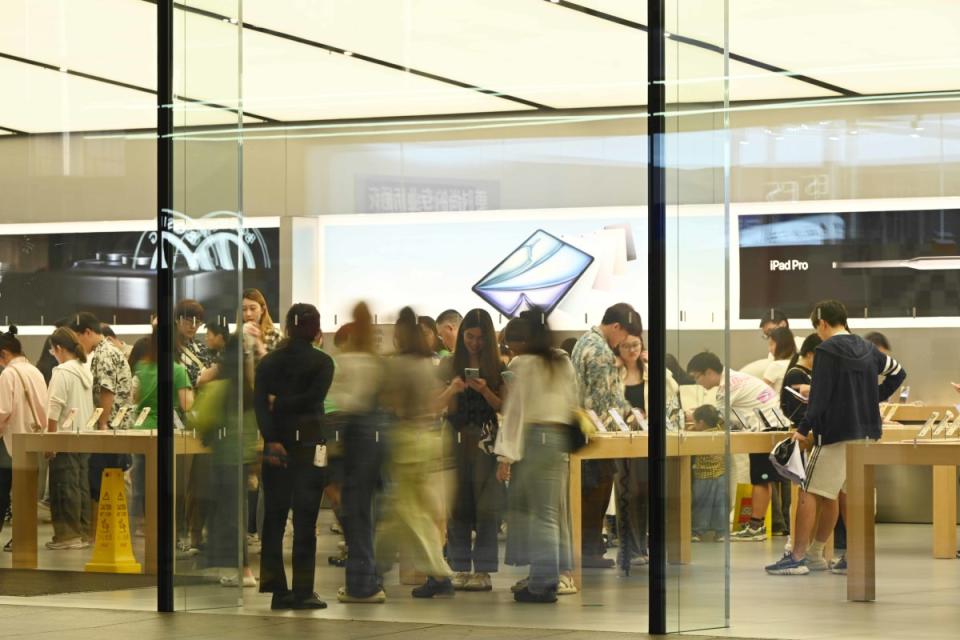Apple CEO Tim Cook's decision raises eyebrows
Tim Cook was hired in 1998 by Steve Jobs from Compaq, where Cook had been content in his role and initially hesitant to leave.
“[Jobs] told me a little about the design, enough to get me really interested," Cook said in an interview with Charlie Rose. "And he was describing what later would be called the iMac. And the way that he talked, and the way the chemistry was in the room, it was just he and I. And I could tell I can work with him.
“I looked at the problems Apple had, and I thought you know, I can make a contribution here. And working with him, and this is a privilege of a lifetime. And so all of a sudden I thought, I’m doing it. I’m going for it.”
This year marks Tim Cook’s 26th year at Apple, where he’s worked with and led the company from the edge of collapse to a tech titan valued in the trillions.
Related: Billionaire fund manager unveils bold Apple stock price forecast
Cook still sticks to his morning routine, waking around 4 a.m. daily. “I’m an early bird,” he said last year on the "Dua Lipa: At Your Service" podcast, adding that the peaceful hours of the morning give him the freedom to focus on what he finds most important.
As he approaches his 64th birthday this November, Cook remains active at Apple's helm. The company is working on several major development projects, including artificial intelligence and augmented reality advancements.
Apple plans to launch iOS 18.1 and Apple Intelligence on Oct. 28 and announce new Macs and an iPad mini in late October, Bloomberg reports.
The big potential associated with those projects may make a recent decision by him curious to some.

NurPhoto/Getty Images
Analysts’ latest updates on Apple
On Oct. 7 Jefferies downgraded Apple (AAPL) to hold from buy with a price target of $212.92, up from $205, thefly.com reported.
The analyst likes Apple Intelligence long term and calls the company “the only hardware-software integrated player that can leverage proprietary data to offer low-cost, personalized artificial intelligence services.”
However, Jefferies warns that expectations for the iPhone 16 and 17 might be "premature," pointing out that AI-capable smartphone technology could still be years from realization. That makes current projections for these models "overly optimistic."
Related: Analyst resets Apple stock forecast ahead of crucial rollout
Bank of America said on Oct. 3 that iPhone Pro ship times were stable but below prior years.
B of A thinks the initial demand could be lower due to the unavailability of Apple Intelligence at launch. The investment firm expects demand to increase after the AI features are available. The firm reiterates a buy rating and $256 price target on Apple shares.
JP Morgan’s Samik Chatterjee gave a similar review on Oct. 2. He said the iPhone 16 launch showed "muted momentum" for high-end models compared with previous cycles, likely due to the lack of AI features at launch.
In response, according to thefly.com, JP Morgan lowered its iPhone forecast to 126 million units for the second half of 2024 from 130 million.
Despite the near-term adjustment, the investment firm remains optimistic about a strong AI-driven cycle in the medium term and reiterates an overweight rating with a $265 price target.
Cook and other Apple executives sell shares
The company disclosed on Oct. 2 that Cook and several other Apple executives recently sold stock in the tech giant.
According to an SEC filing, Cook sold 223,986 shares valued at approximately $50.28 million.
Apple’s stock price surpassed $200 a share in June and reached a record $236 in July. Cook sold his shares at an average price of more than $220.
More AI Stocks:
Analyst revisits Meta stock price target as Facebook parent ramps AI spend
Analyst reviews BlackRock stock rating after AI partnership with Microsoft
Other executives who sold shares include Chief Operating Officer Jeff Williams, who sold 59,370 shares for $13.5 million; Senior Vice President of Retail Deirdre O'Brien, who sold 61,019 shares for $13.8 million; and Katherine Adams, general counsel and senior vice president for legal and global security, who also sold 61,019 shares for $13.8 million.
Some investors were surprised by Cook's decision to sell stock during the much-anticipated iPhone launch and early in the AI development cycle.
However, investors should remember that executives, including CEOs, sell stock for many reasons. A significant share of executive compensation comprises stock options and restricted stock units, or RSUs.
For instance, the shares Cook sold were awarded to him this year as part of a total shareholder return ("TSR") plan based on Apple's stock market return relative to other S&P 500 companies "from the first day of Apple's fiscal year 2022 and ending with the last day of Apple's fiscal year 2024."
Further, Cook disclosed that he'd be selling shares via a rule 10b5-1 trading plan set up on May 21 when shares were trading at $192, well before the actual sale.
Executives use these plans to inform investors of planned transactions, giving them time to prepare. These plans also reduce the risk that an executive bases a decision to sell or buy on inside information.
Cook has also sold shares in the past, including in April and last October. These sales are detailed on Form 4 filings with the Securities and Exchange Commission.
Therefore, Cook's decision may be less because he thinks Apple shares are pricey and more because he's diversifying his wealth. After selling shares, he still owns 3.28 million shares worth over $700 million.
Related: The 10 best investing books, according to our stock market pros